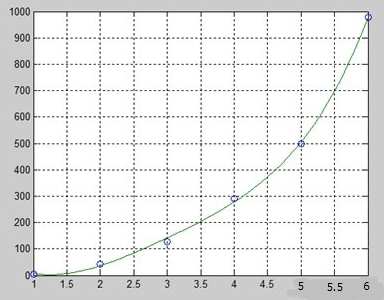p = [1 7 0 -5 9];
MATLAB计算多项式
MATLAB中 polyval 函数用于将指定的值 - 计算多项式。例如,要计算我们本节开始时举例的多项式 p, x = 4,输入:
p = [1 7 0 -5 9]; polyval(p,4)
MATLAB 执行上述语句,返回以下结果:
ans = 693
MATLAB 还提供了计算矩阵多项式 polyvalm 函数。矩阵多项式一个多项式矩阵变量。
例如,我们建立一个正方形矩阵 X 并计算多项式 p:
p = [1 7 0 -5 9]; X = [1 2 -3 4; 2 -5 6 3; 3 1 0 2; 5 -7 3 8]; polyvalm(p, X)
MATLAB执行上述语句,返回以下结果:
ans =
2307 -1769 -939 4499
2314 -2376 -249 4695
2256 -1892 -549 4310
4570 -4532 -1062 9269
查找多项式的根
根函数可以计算多项式的根。
例如,要计算多项式 p,输入根:
p = [1 7 0 -5 9]; r = roots(p)
MATLAB执行上述语句,返回以下结果:
r = -6.8661 + 0.0000i -1.4247 + 0.0000i 0.6454 + 0.7095i 0.6454 - 0.7095i
poly 函数是根函数,并返回多项式的系数的倒数。
例如:
p2 = poly(r)
MATLAB执行上述语句,返回以下结果:
p2 =
1.0000 7.0000 0.0000 -5.0000 9.0000
多项式曲线拟合
polyfit 函数找到一个多项式的系数,适合采用最小二乘意义上的一组中的数据。
如果 x 和 y 是两个向量含有的 x 和 y 被拟合数据的一个 n 次多项式,那么我们得到的多项式拟合的数据通过写入
p = polyfit(x,y,n)
详细例子
在MATLAB中建立一个脚本文件,并输入下述代码:
x = [1 2 3 4 5 6]; y = [5.5 43.1 128 290.7 498.4 978.67]; %data p = polyfit(x,y,4) %get the polynomial % Compute the values of the polyfit estimate over a finer range, % and plot the estimate over the real data values for comparison: x2 = 1:.1:6; y2 = polyval(p,x2); plot(x,y,'o',x2,y2) grid on
运行该文件,MATLAB显示以下结果:
p =
4.1056 -47.9607 222.2598 -362.7453 191.1250
并绘制下图:

